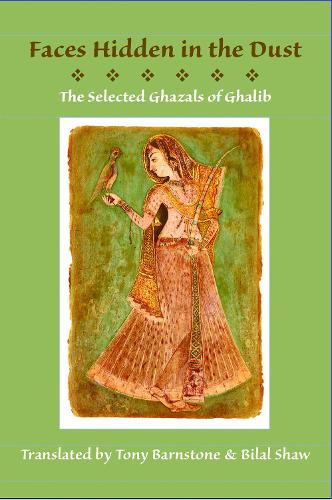
Faces Hidden in the Dust: Selected Ghazals of Ghalib
(Paperback)
Publishing Details
Faces Hidden in the Dust: Selected Ghazals of Ghalib
By (Author) Tony Barnstone
Translated by Bilal Shaw
By (author) Mirza Asadullah Khan Ghalib
White Pine Press
White Pine Press
8th February 2022
United States
Classifications
General
Non Fiction
891.43913
Physical Properties
Paperback
180
Width 228mm, Height 152mm
Description
Mirza Asadullah Beg Khan (1797-1869), known by his pen names Asad (lion) and Ghalib (superior), is the famous romantic and mystical poet of the Mughal Empire (1526-1858) in India. He is the most-beloved and most widely read poet of the Urdu language, the dominant language of northern India and Pakistan that emerged through the blending of Hindustani with Arabic and Persian.
Reviews
"Ghalib is the Shakespeare of India, the last great poet of the Mughal empire. His poems have been sung in Urdu gatherings for centuries, offering visions of passionate love in a merging of the human and divine. Tony Barnstone and Bilal Shaw have made them sing in English. John Balaban - prize winning poet, translator
Author Bio
Mirza Asadullah Beg Khan (1797-1869), known by his pen names Asad (lion) and Ghalib (superior), is the famous romantic and mystical poet of the Mughal Empire (1526-1858) in India. He is the most-beloved and most widely read poet of the Urdu language, the dominant language of northern India and Pakistan that emerged through the blending of Hindustani with Arabic and Persian. He is known for the beautiful prose of his letters and in fact he brought about a paradigm shift in how letters were written and communicated during his time. His focus on informal yet beautiful writing, rather than flowery formal prose, was his greatest contribution to the art of writing Urdu letters. He is also arguably the worlds most extraordinary writer of poems in the ghazal form (though certain Persian poets such as Hafez and Rumi give him a run for the money). Tony Barnstone is Professor of English and Environment Studies at Whittier College and the author of 19 books and a music CD. He has served as the Visiting Distinguished Professor in Creative Writing in the MFA Program at Bowling Green State University and as the Visiting Professor of Translation in the Ph.D. Program at the University of California, Irvine. He has a Masters in English and Creative Writing and Ph.D. in English Literature from the University of California at Berkeley. In addition to Pulp Sonnets, his books of poetry include Beast in the Apartment; Tongue of War: From Pearl Harbor to Nagasaki, winner of the John Ciardi Prize in Poetry; The Golem of Los Angeles which won the Poets Prize and the Benjamin Saltman Award in Poetry; Sad Jazz: Sonnets; and Impure: Poems by Tony Barnstone, and a chapbook of poems titled Naked Magic (Main Street Rag). He is also a distinguished translator of Chinese poetry and literary prose and an editor of literary textbooks. His books in these areas include Mother Is a Bird: Sonnets of Yi Poet; Chinese Erotic Poetry; The Anchor Book of Chinese Poetry; Out of the Howling Storm: The New Chinese Poetry; Laughing Lost in the Mountains: Poems of Wang Wei; The Art of Writing: Teachings of the Chinese Masters; and the textbooks Literatures of Asia, Africa and Latin America, Literatures of Asia, and Literatures of the Middle East. His bilingual Spanish/English selected poems, Buda en Llamas: Antologa potica (1999-2012) appeared in 2014. He has also co-edited the anthologies Dead and Undead Poems and Monster Verse. Among his awards are the Poets Prize, Grand Prize of the Strokestown International Poetry Festival, the Pushcart Prize in Poetry, fellowships from the National Endowment for the Arts, the National Endowment for the Humanities, and the California Arts Council, the Benjamin Saltman Award in Poetry and the John Ciardi Prize in Poetry. His CD of folk rock/blues songs (in collaboration with singer-songwriters Ariana Hall and John Clinebell, based upon Tongue of War and titled Tokyos Burning: World War II Songs) is available on Amazon.com, Rhapsody, and CD Baby. His website is https://www.whittier.edu/academics/english/barnstone Bilal Shaw is a Kashmiri scientist working in quantum information science who did his PhD at the University of Southern California. In the past he has worked on DNA-based computation and nanotechnology, software architecture, and theoretical self-assembly. He has worked as a scientist in the Analytics department at ID Analytics in San Diego, where he applied machine-learning techniques to build statistical risk models for fraud and credit space and at the meditation app Headspace. He is also an accomplished poet.
